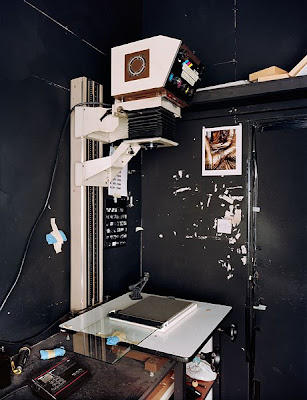 ...a survey of London's remaining professional darkrooms.
...a survey of London's remaining professional darkrooms.Richard Nicholson's series of photographs and brief essay seems a very appropriate follow-up to the previous posts.
Darkrooms are disappearing. Polaroid film: going, going, gone. Yet, an increasing number of young photographers are interested in working with these analogue technologies. They are intrigued by the hands-on craft of darkroom work: the engagement of all five senses in the art making process. Something similar accounts for the recent resurgence of respect for painting at art schools in this country. Ditto, the massive interest in DIY and "upcycling" amongst young designers. The zeitgeist is evident at the cutting edge of other academic disciplines as well: ideas like "embodied cognition", and the flourishing of research into mirror neuron systems are two examples from cognitive science and neuroscience, respectively. These ideas have taken off in the context of a society-wide paradigm shift in the technologies we use, and in how we think about communication (Web 2.0, for instance). In a recursive fashion, the technology itself has given legitimacy to areas of exploration which previously were considered "infradig". It has become OK in art, and in science, to seriously explore affect, intuition, empathy, and to give the body it's due. Our embrace of digital technology has left more space around the edges for different sorts of creative thinkers, and that is a good thing.
I'll be returning to this theme over the course of future posts. But for now, let me leave you with this thought:
Obsolescence is a terribly over-rated concept.
In seminar today we were talking about the modern (as in 15th and 16th century) relationship with nature and technology. I've got that nice Folio edition of Frankenstein in my room and we've been talking about Frankenstein for the past couple days. Interesting it is that when Dr. Frankenstein creates the "being"/ "monster" his issue with it is that it's not PERFECT. He's not astonished with the accomplishment of creating life, but is absorbed in its lack of perfection. I think that's a problem technology, it drives people to thinking that everything can be solved with more technology and everything can be perfected with more "efficient" gadgets. Lets see the occult! The imperfect! Light leeks and all : )
ReplyDeleteThanks for your comment, Claire. There is much to think about in what you have said. You are part of the first generation to have grown up with laptops, the web, facebook, etc., so your take on this topic is very interesting to me. Your seminar sounds fabulous.
ReplyDeleteinteresting to you, and according to Storch "scary"...or he said something along those lines
ReplyDeleteThis is an outdated response to the post, but I am in reinforcing the theme of recursiveness...
ReplyDeleteI have been thinking a lot lately about the tensions between method and theory- so what is the subject flows into the method of its investigation...in this sense, new technologies can end the stalemate over methods to challenge what the sociologist C. Wright Mills calls "the fetishism of the Concept."
Erin